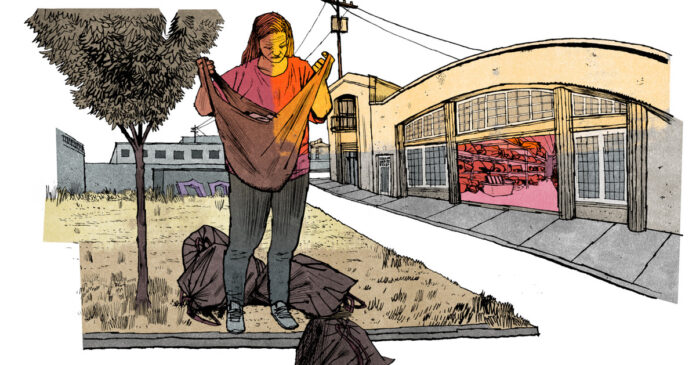Reporting Highlights
- Lost Belongings: As cities remove more encampments, they often take people’s belongings, which can include items needed to survive and irreplaceable mementos.
- Storage Programs: Some cities with large homeless populations have been sued for depriving people of their property; in response, they established programs to store what’s taken.
- Failed Policies: ProPublica examined such programs and found that people whose belongings are taken in encampment removals rarely get them back.
These highlights were written by the reporters and editors who worked on this story.
When Stephenie came upon workers in Portland, Oregon, who had bagged up all of her belongings in a homeless encampment sweep, she desperately pleaded to get one item back: her purse. It contained her cash and food stamp card — what she needed to survive.
The crew refused to look for it, she said. The items workers had put in clear bags were headed to a city warehouse. Those in black bags were headed to a landfill.
They handed her a card with a phone number to call if she wanted to pick up her things.
Credit:
Photo provided by Portland officials
Pregnant and hungry, Stephenie was supposed to rest and avoid heavy lifting. She now had to start all over. In the days that followed last September, Stephenie slept on a sidewalk for the first time. She said she attempted suicide.
“I had nowhere to go — no place, no tent, no nothing. I couldn’t even feed myself,” she said. “The lowest point I’ve ever been in my life was after the sweep.”
As homelessness has reached crisis levels, more cities are clearing tents and encampments in operations commonly called sweeps. Since a U.S. Supreme Court decision in June allowed cities to punish people for sleeping outside, even if there’s no shelter available, some have made their encampment policies more punitive and increased the frequency of sweeps.
Some cities have programs to store what they take, sometimes created in response to lawsuits. In theory, these storage programs are supposed to protect people’s property rights and make it easy to get their possessions back.
In reality, they rarely accomplish either objective, according to a ProPublica investigation of the policies in regions with the largest homeless populations.
ProPublica obtained records from 14 cities showing what was stored following encampment clearings. In Los Angeles and San Diego, thousands of encampments are removed each year, but the belongings taken from them are rarely stored, the records showed. San Diego, for example, removed more than 3,000 sites during 2023 but only documented storing belongings 19 times. In Seattle, the city removed nearly 1,000 encampments during a six-month period last year and stored belongings from just 55 of them.

Credit: Asia Fields/ProPublica
Even when possessions are stored, the records showed, people are rarely able to reclaim them. In Portland, which stores the most among the cities ProPublica reviewed, property was reclaimed 4% of the time during a recent 12-month period. In San Francisco, property was reclaimed roughly 12% of the time over 18 months; much of what the city stored was collected after contact with police. Records provided to ProPublica by Anaheim, California, showed nothing had been retrieved from January 2023 through May of this year.
Some cities did not address ProPublica’s questions about the low rates at which people are able to retrieve their belongings. But they broadly defended their encampment practices, saying that they balance the rights of people experiencing homelessness with public health needs.
In Portland, officials said they manage an extensive database of stored belongings and “share in the collective frustration in the difficulties in managing a system that works well for everyone.” When asked about the sweep in which Stephenie’s items were taken, they acknowledged that camp removals are harmful to unhoused people, but that they must also maintain city property and natural areas.
ProPublica heard from at least 95 people who had experienced encampment clearings in cities with programs to store belongings. Thirty said they tried to recover their belongings but hit obstacles, such as being unable to reach anyone at the facility or the site not having everything that was taken. Only one person got back all of his items.
The rest said they didn’t try, often because they didn’t know how to go about it, lacked phones or transportation, or thought, and in some cases saw, that their belongings had already been thrown away.




